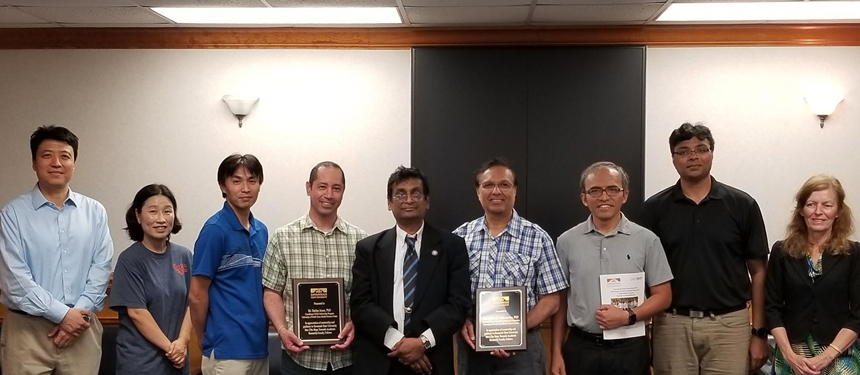Celebrating success in health disparities program
By Alex Branch
Jamboor Vishwanatha, PhD, and Harlan Jones, PhD, recently visited Savannah State University to discuss a national research mentoring project.
They got a big surprise.
The Georgia university honored Dr. Vishwanatha, Dr. Jones and the UNT Health Science Center Steps Toward Academic Research (STAR) Fellowship Program for their impact on the school’s junior research faculty.
Among the attendees were five graduates of the Fellowship Program, which involves one year of collaboration and training with UNTHSC faculty. The graduates have earned a combined $8 million in research funding since completing the fellowship.
“It was tremendous to see how successful they have been and how much they benefited from participating in the STAR Fellowship Program,” said Dr. Vishwanatha, Project Director for the Texas Center for Health Disparities at UNTHSC. “We had no idea what they were planning until they rolled out the cake.”
Each year the STAR Program has selected 10 fellows – five faculty fellows and five community stakeholders who want to learn more about research – with an interest in health disparities. The faculty fellows are chosen from minority-serving institutions.
The program combines on-site faculty development and education with distance learning tools like video conferencing, online digital meetings and other technologies.
“It’s a comprehensive approach designed to improve their grant-writing efficacy and advance their professional development,” Dr. Jones said. “Bringing the fellows on campus allows them to experience the UNT Health Science Center’s research framework and interact with our faculty.”
Graduates return to their institutions and share their newly-acquired research knowledge with undergraduates and fellow faculty. About 130 faculty members from minority-serving institutions across the United States have been trained through the program since 2005.
“So the impact of the program is actually much bigger,” Dr. Vishwanatha said. “These fellows become role models for others and teach and inspire them to pursue successful research.”
The STAR Program is funded by the National Institutes of Health. The National Institute of General Medical Sciences funds the National Research Mentoring Network. The National Institute on Minority Health and Health Disparities funds the Texas Center for Health Disparities.


![Uyen Sa Nguyen Scaled[58]](https://www.unthsc.edu/newsroom/wp-content/uploads/sites/16/Uyen-Sa-Nguyen-scaled58-145x175.jpg)



Social media